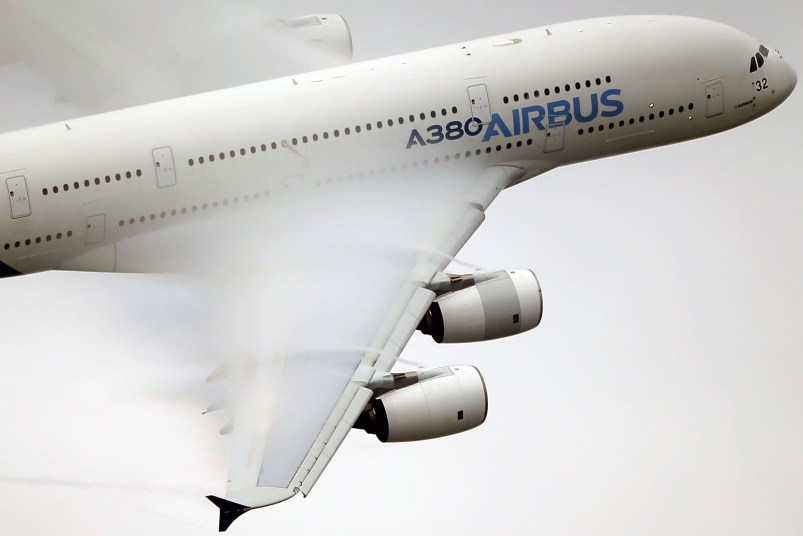PARIS (AP) — Airbus says the aviation industry’s unprecedented troubles are just beginning.
The European manufacturing giant reported 481 million euros ($515 million) in losses in the first quarter, put thousands of workers on furlough and sought billions in loans to survive the coronavirus crisis. And its CEO said Wednesday it’s still at an “early stage.”
Even after virus-related travel restrictions eventually ease, Chief Executive Guillaume Faury acknowledged it will take a long time to persuade customers to get back on planes. Just how long, he can’t predict.
“We are in the gravest crisis the aerospace industry has ever known,” Faury said. “Now we need to work as an industry to restore passenger confidence in air travel as we learn to coexist with this pandemic.”
Images shared online of packed planes and maskless, elbow-to-elbow passengers on U.S. flights – despite virus protection guidelines – have worried travelers and airline unions alike. International travel restrictions, meanwhile, have grounded thousands of planes worldwide.
Faury insisted that airplanes are “probably the best place to be” during a virus outbreak because of air filtration systems put in place after previous virus outbreaks and other threats, but said Airbus will work with aviation authorities to try to calm the public.
Shares in Airbus and Boeing have dropped some 60% this year as customer airlines collapse or seek billions of dollars in government bailouts.
Airbus was unable to deliver 60 planned planes in the quarter because of virus-related problems, and said the second quarter looks similarly rough. Customers are asking for delays, which Faury called “the biggest issue we are managing at the moment.”
Airbus executives expressed hope Wednesday that deliveries could start picking up in the second half of the year. But they refused to issue long-term guidance given that the virus is still spreading, and that governments are reluctant to relax international travel restrictions.
U.S. rival Boeing is facing similar woes. Boeing’s CEO said Monday that it will take years for the aircraft-building business to return to levels seen before the coronavirus pandemic.
Airbus has slashed production by a third since the virus hit, and Faury said Airbus will study “resizing” the company after the crisis ebbs – a worrying prospect on a continent where Airbus has factories in four countries and is one of the region’s industrial leaders.
Already 3,000 Airbus workers in France are on temporary unemployment and the number is expected to grow. In addition, 3,200 workers in the U.K. are on furlough and negotiations are under way to put thousands of German workers on short work plans.
A recent letter by Faury warning workers that the company is “bleeding cash” was a shock to many. But Frederic Romain of French union CFTC said “the situation requires transparency. It allows workers to open their eyes” to what’s ahead.
“Fears? We have a lot of them. For the moment we don’t have a clear vision of what awaits us,” Romain said.
Airbus reported a 15% drop in revenues to 10.6 billion euros in the first quarter.
Looking longer term, Faury insisted that Airbus remains committed to reducing airplane emissions but said it’s “less urgent” than before the coronavirus crisis because the company has more pressing problems to solve. “For practical cash reasons,” Airbus has stopped or suspended some projects aimed at “decarbonizing” its production, he said.







‘Faury insisted that airplanes are “probably the best place to be” during a virus outbreak because of air filtration systems put in place after previous virus outbreaks and other threats…’
So much I could comment on regarding this report but I’ll confine myself a little to keep this short and to the point.
After years of travelling, I can attest that these guys build aircraft that allows airlines to treat most of us like cattle. I don’t know on what planet he’s on but an aircraft…i.e. an aluminum tube…is in no way a ‘best place to be’…imho…of course.
Agreed, the airlines trying to pack passengers in like sardines in ever tinier seats, was the actual start of this crisis.
Tough sell.
Faury insisted that Airbus remains committed to reducing airplane emissions but said it’s “less urgent” than before the coronavirus crisis because the company has more pressing problems to solve.
This is me scratching my head… Perhaps this is a fine time to radically re-think, re-imagine and re-engineer air travel of the future?
Perhaps this is a fine time to radically re-think, re-imagine and re-engineer air travel of the future?
The 20th century created the airline industry.
The 21st century may very well end it.
I think we can assume that means their participation in CORSIA/carbon offsets is functionally dead for the foreseeable future.
This is strong argument that carbon indulgences are not a sustainable method to reducing carbon emissions.